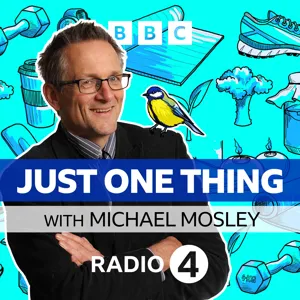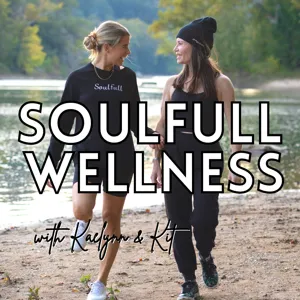Podcast Summary
Incorporating dark chocolate into daily routine for health benefits: Dark chocolate improves heart health, lowers blood pressure, boosts brain power, and is a simple, enjoyable way to improve overall well-being. Make small, manageable changes for significant health benefits.
Learning from this podcast episode is the simple yet impactful act of incorporating dark chocolate into your daily routine as a healthier alternative to sugary snacks. The discussion highlighted the benefits of dark chocolate, which is rich in flavonoids, a nutrient found in certain plants, and may improve cardiovascular health, lower blood pressure, and even boost brain power. This small change can be easily implemented in one's daily life and may lead to significant health benefits. Furthermore, the podcast episode also touched upon the importance of making small, manageable changes to improve overall well-being. It's not necessary to completely overhaul your lifestyle all at once, but rather focus on one thing at a time that can make a positive impact. Additionally, the episode featured a promotion for PlushCare, an online healthcare platform that offers virtual consultations with board-certified physicians and the ability to prescribe weight loss medications for those who qualify. The convenience and accessibility of this service can be a game-changer for individuals looking to prioritize their health and wellness. Lastly, the episode emphasized the importance of self-care and indulging in small pleasures, like a piece of dark chocolate, to maintain a balanced and fulfilling life.
Dark Chocolate and Health Benefits: Regularly consuming dark chocolate or unsweetened cocoa may lead to reduced blood pressure, improved insulin resistance, and enhanced cognitive function due to flavonoids in its bitter seeds.
Incorporating a small amount of dark chocolate into your daily routine could potentially lead to various health benefits. The temptation to constantly snack on unhealthy options can be strong, but substituting with a couple of squares of dark chocolate may help curb cravings and even improve focus and cognition. The science behind this lies in the flavonoids found in dark chocolate, particularly in its bitter seeds. These plant nutrients have been linked to reduced blood pressure, improved insulin resistance, and enhanced cognitive function. Studies have shown that consuming dark chocolate or unsweetened cocoa regularly can lead to these benefits. For instance, a study in Portugal found that eating 20 grams of dark chocolate daily for a month resulted in a small but significant decrease in blood pressure. Another study in Italy showed that older adults who consumed a high flavonoid cocoa drink experienced improvements in their blood pressure, insulin resistance, and cognition. A brain imaging study also revealed that those who drank high flavonoid drinks were able to complete cognitive tests more efficiently and showed better oxygenation and improved blood flow in their brains. So, while it's important to keep in mind that dark chocolate should still be consumed in moderation, the potential benefits make it a worthwhile addition to a healthy diet.
Dark chocolate and heart health benefits: Dark chocolate with 40-50% cocoa can improve heart health by reducing blood pressure, improving blood flow, and enhancing insulin and cholesterol levels, but Dutch processed chocolate eliminates these benefits
Dark chocolate, particularly those with a higher percentage of cocoa, contains flavonoid compounds called flavonols that have been shown to provide heart health benefits, as well as potential cognitive benefits. These benefits include reducing blood pressure, improving blood flow, and enhancing insulin and cholesterol levels. The darker and more bitter the chocolate, the higher the levels of these beneficial compounds. However, the chocolate industry often uses a process called Dutch processing to improve mouthfeel and reduce bitterness, which unfortunately also eliminates many of these beneficial flavonoids. To maximize the health benefits, aim for dark chocolate with a cocoa percentage of around 40-50%, and limit yourself to a few squares a day. These small amounts of dark chocolate can have clinically relevant effects on blood pressure, cholesterol levels, and blood flow, even in the short term.
Dark Chocolate and Cognitive Abilities: Consuming dark chocolate weekly may boost cognitive functions like memory and learning due to flavonols, found in various foods like dark chocolate, fruits, veggies, tea, red wine, and apples.
Consuming a few squares of dark chocolate a few times a week, as suggested by epidemiological data, may have health benefits due to the presence of flavonoids, particularly cocoa flavanols. These compounds are metabolized in the gut, producing metabolites that can cross the blood-brain barrier and have neuroprotective effects, potentially improving cognitive abilities, memory, and learning. Flavonols are also found in various fruits, vegetables, tea, red wine, and apples, providing multiple options for incorporating them into your diet. Christine, a volunteer in a study, reported enjoying her week of incorporating dark chocolate into her routine and experiencing increased energy levels and motivation to learn new skills. Overall, the science suggests that incorporating flavonol-rich foods into your diet, including dark chocolate, can have positive health effects.
Discover the benefits of dark chocolate and exercise in small doses: Incorporating dark chocolate and short exercise sessions into your daily routine can positively impact your heart, blood pressure, brain, and overall well-being.
Incorporating just two squares of dark chocolate into your daily routine can have positive effects on your heart, blood pressure, and brain. This simple change is just one of the "Just One Thing" tips discussed in the podcast. Another episode explores the benefits of doing small chunks of exercise throughout the day instead of one long session. The poet laureate has gone to his shed for a new series of radio 4 podcasts, where he chats with guests about life and creativity. Three years may bring changes, but the need for health insurance remains constant. UnitedHealth Care TriTerm Medical plans offer flexible and budget-friendly coverage that lasts nearly three years in some states. Lastly, Quince offers high-quality fashion at 50 to 80% less than similar brands, with a commitment to safe, ethical, and responsible manufacturing.





